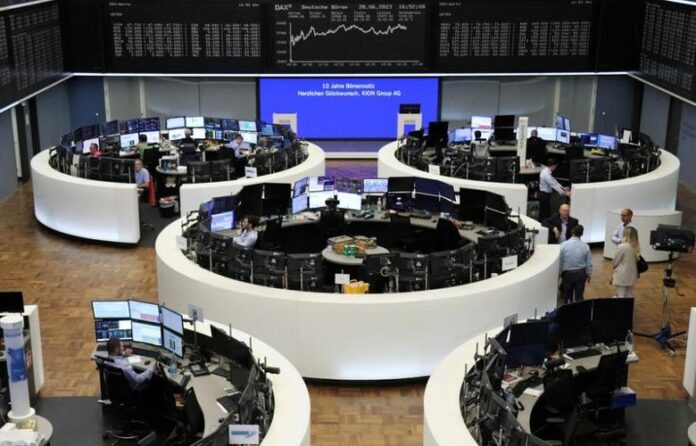Asian equities edged up on Friday as dismal Chinese manufacturing activity data fueled hopes of further intervention, despite solid US economic data bolstering the belief that the Federal Reserve will remain hawkish for longer.
The yen remained vulnerable after breaching the psychologically significant level of 145 per dollar, fueling intervention fears as Japan’s Finance Minister Shunichi Suzuki issued yet another caution against excessive currency weakness.
Futures indicated European stocks were set for a higher open, with Eurostoxx 50 futures up 0.18%, German DAX futures up 0.24% and FTSE futures 0.28% higher.
MSCI’s broadest index of Asia-Pacific shares outside Japan (.MIAPJ0000PUS) was 0.3% higher in choppy trading, on course to eke out a gain of just over 1% in the first half of the year.
Investors’ focus on Friday will be on the U.S. Personal Consumption Expenditures (PCE) index reading, the Fed’s favoured inflation gauge.
But before that euro zone June inflation data will likely provide cues to the broader picture in the region, after data on Thursday showed German inflation rose more than expected in June.
Economists polled by Reuters expect euro zone inflation to fall to 5.6% in June from 6.1% in May.
While German consumer prices, harmonised to compare with other European Union countries, rose by a higher-than-anticipated 6.8% on the year in June, inflation fell sharply in Spain and Italy.
“There is a growing divergence in the path of inflation across the region, which is leading to some disagreement about the right path for policy,” said Rob Carnell, ING’s regional head of research, Asia-Pacific.
“Though one suspects that the response will be, if in doubt, hike.”
Data through the week has painted a picture of a resilient U.S. economy that has eased some of the worries of an impending recession but also stoked expectations that the Fed will stay on its hawkish path.
The number of Americans filing new claims for unemployment benefits unexpectedly fell last week, pointing to continued labour market strength, while first quarter GDP was sharply revised upward.
Federal Reserve Chair Jerome Powell signalled on Thursday that the U.S. central bank was likely to resume its monetary tightening campaign after a break earlier this month.
The strong economic data sent Treasury yields higher, with the yield on 10-year Treasury notes touching a three-month high of 3.868% on Thursday. It was last at 3.839%.
Meanwhile, China’s factory activity declined for a third straight month in June and weakness in other sectors deepened, official surveys showed on Friday, adding pressure for authorities to do more to shore up growth as demand falters at home and abroad.
China’s blue-chip CSI300 Index (.CSI300) and the Shanghai Composite Index (.SSEC) rose nearly 1%, while Hong Kong’s Hang Seng Index (.HSI) was up 0.24% on stimulus hopes.
In the currency market, the yen remained in spotlight, briefly trading at 145.07 per dollar – a fresh seven month low and breaking through the 145 barrier that analysts have been watching out for possible intervention.
When the yen breached the 145 level last September, authorities intervened in markets to support the currency for the first time in 24 years. The yen was last at 144.67 per dollar.
“The government is watching currency market moves with a great sense of urgency,” Shunichi Suzuki said. “We will respond appropriately if the moves become excessive.”
Japanese authorities are under pressure to combat a continued yen fall driven by market expectations that the Bank of Japan will keep interest rates ultra-low, even as other central banks tighten monetary policy to curb inflation.
U.S. crude was flat at $69.87 per barrel and Brent was at $74.49, up 0.2% on the day.


